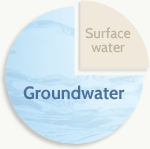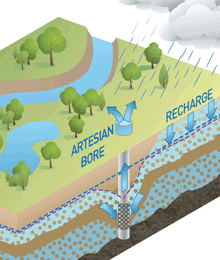Groundwater is a precious natural resource that supplies 75% of Mississippi's water needs.
Where Your Groundwater Comes From
The State of Mississippi uses about 3½ billion gallons of water every day. Only one-fourth of that comes from surface water like lakes or reservoirs. The other 2½ billion gallons comes from groundwater: rainfall that has traveled through soil and miles of underground sand deposits to the water wells you use.
Groundwater Safety
Thanks to natural filtration, most groundwater is safe to drink with very little treatment. A small amount of chlorine may be added for disinfection. But because the path from rainwater to tapwater is so long, it's potentially exposed to ground pollution, chemical runoff, and contamination from river or sewer runoff. Keeping groundwater safe, clean and inexpensive to treat means taking care of land and water.
Keeping Groundwater Clean
- Conserve the water you receive: try not to waste water, and keep your water equipment in good repair and free from leaks.
- Re-use water when you can. Water from washing can be used again to water plants, for instance. You can even select plant-friendly shampoos and soaps to make this process easier.
- See that your community ordinances help ensure that groundwater is used properly, and that pollution is kept low. The EPA's A Citizen's Guide to Groundwater Protection can help.
- If you have a private water well check it regularly for quality.
For Those on Private Wells
Just as you check your furnace or smoke detector batteries seasonally, spring is a good season to have an annual water well checkup before the peak water use season begins.
Good well maintenance can prolong the life of your well and save money in repair costs over time. Test your water annually, or whenever there is a change in taste, odor, or appearance, or if you have your system serviced.
An annual checkup by a qualified water well contractor is the best way to ensure problem-free service and quality water.
Good Practices for Your Home Well
The Mississippi State Department of Health recommends that home well owners:
- Keep hazardous chemicals, such as paint, fertilizer, pesticides, and motor oil far away from your well, and maintain a "clean" zone of at least 50 feet between your well and any kennels and livestock operations.
- Maintain proper separation between your well and buildings, waste treatment systems, and chemical storage areas. 50 feet is recommended. Your well must also be uphill from and 100 feet away from any discharge of treated sewage.
- Periodically check the well cover or well cap on top of the casing (well) to ensure it is in good repair and securely attached. Its seal should keep out insects and rodents.
- Keep your well records in a safe place. These include the construction report, and annual water well system maintenance and water testing results.
- Well Owners' Information SheetsHelpful information about owning and maintaining a home well
Your annual water well checkup
A check of your well by a qualified water well contractor may include:
- A flow test to determine system output, along with a check of the water level, pump motor performance, pressure tank and pressure switch contact, and general water quality (odor, cloudiness, etc.).
- A well equipment inspection to assure that it's sanitary and meets local code.
- A test of your water for coliform bacteria and nitrates. Other typical additional tests are those for iron, manganese, water hardness, sulfides, and other water constituents that cause problems with plumbing, water appearance, and odor.
The presence of coliform bacteria is a possible indicator of a well's susceptibility to contamination from animal wastes. E. coli is bacteria that originates in wastes such as those found in sewage, and it can result in severe illness. Its presence suggests a contamination source such as a poor performing home septic system in the vicinity of the well.
For Those on Public Water Systems
Rural Water Associations, Municipal Water, Water Districts, etc.
Most systems that fall into these categories are public water systems regulated by MSDH. Their water is tested on a regular basis as directed by the EPA. Anytime a system is out of compliance, the public is notified directly, or in a yearly compliance report, depending on severity.
The entire State of Mississippi is covered by 10 Regional Engineers who inspect systems, resolve complaints, review plans and specifications for system upgrades, and teach water operators how to properly run their facility in order to produce the best water possible for your consumption.



